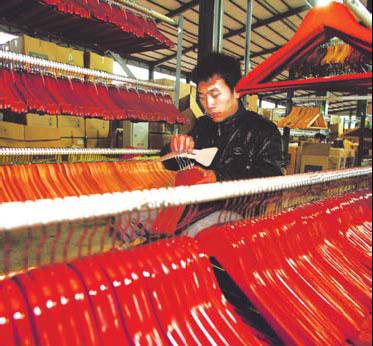
A worker racks up wooden clothes hangers at a factory in Lipu county. More than 90 percent of the clothes hangers produced in the county will be exported to Europe, the United States, and Southeast Asia. [China Daily]
The next time you're shopping for clothing at a supermarket in Europe or the United States, take a close look at the clothes hangers. If they say "Made in China," there's a good chance they come from a small county named Lipu, south of Guilin, one of China's most picturesque cities.
More than 90 percent of the hangers made in Lipu county, in South China's Guangxi Zhuang autonomous region, are shipped to Europe, the United States and Southeast Asian countries, accounting for half of the country's total production.
With more than 26 clothes hanger manufacturers and an annual output of about 200 million units, the county's hanger industry reached 180 million yuan ($27 million) in sales revenue and 150 million yuan in export turnover in 2009, a cash cow for the resource-short county.
With industrial output and sales revenue for clothes hangers reaching 2 billion yuan, and accounting for nearly 40 percent of the local economy, the number of manufacturers in Lipu county is expected to continue to grow.
The county's booming success story all started with a businessman named Qin Yuxiang, who took an order from a foreign trade company 22 years ago.
As head of a small wood-processing factory employing only 10 workers and manufacturing all products by hand, Qin received an order from an import-export trade company in 1989 to produce 100,000 hangers within six months. He completed the project and opened a gate of profits to his then tiny workshop.
"The deal was such a surprise," Qin said of the turning point in his career. "The price of a wooden hanger was only 1 yuan in China, but it could be sold abroad for three times as much."
In 2009, with total assets of 60 million yuan and 1,500 employees, Qin's factory attained an output value of nearly 200 million yuan, becoming one of China's largest manufacturers of wooden clothes hangers.
Customers are scattered all over the world and the company has a $6.5 million order from the global retail giant Wal-Mart. Further orders have come from other leading retailers, including Ikea, Kmart, Carrefour and Target.
Qin has plans to mechanize the production lines to double output over the next three to five years and produce an annual output value of more than 200 million yuan.
To strengthen communication and cooperation among clothes hanger manufacturers and parts companies, the county has set up an association to improve relations and prevent unfair competition.
The burgeoning industry has boosted local employment. The local government estimates that the industry will generate job opportunities for 30,000 people and increase annual per capita income.
"The booming clothes hanger businesses has helped lower the unemployment rate," said Zhao Yufang, a factory worker whose family members all work in the industry. "Now I am paid 700 yuan a month, as opposed to only 400 yuan when I was a farmer."
Meanwhile, the development of local manufacturing has encouraged those who migrated to coastal provinces to return home. "The salary is the same here as that in Shenzhen where I used to work," said Mo Lixiang, a factory worker. "But the good thing is that I can take care of my family here."





